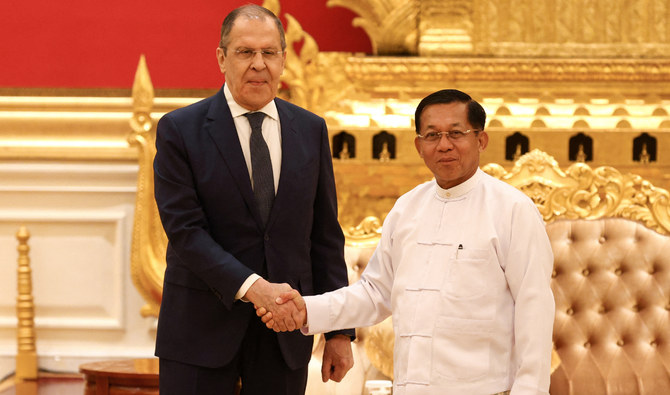YANGON: Myanmar’s junta chief arrived in Vladivostok on Monday to attend the Eastern Economic Forum, his second trip to Russia in less than two months, in what former officials said is part of the ruling military’s attempt to establish “special relations” with Moscow.
The southeast Asian country has maintained friendly ties with Russia since the junta seized power from the elected government of Aung San Suu Kyi in February 2021. The coup saw Myanmar slapped with sanctions from Western countries and faced with a downgrade in relations, with Moscow under the same scrutiny over its invasion of Ukraine, which it calls a “special military operation.”
In July, Myanmar and Russia agreed to deepen their defense cooperation when Snr. Gen. Min Aung Hlaing visited the latter on what was reported as a private visit. The junta announced last month that Yangon planned on importing Russian oil, after Min Aung Hlaing met Russia’s Foreign Minister Sergei Lavrov in Naypyidaw.
Min Aung Hlaing, who first visited Moscow as leader last June, is set to meet with Russian officials and visit landmarks, universities, and factories during this week’s visit, according to a report from Myanmar state media. This is “to further cement cooperation in friendly relations, economic and other sectors between governments and peoples of both countries.”
Though it is “more risky,” the junta chief is likely trying to get closer to Russia for military aid, a former army official who had also served as a lawmaker in Myanmar’s parliament, told Arab News.
“General Min Aung Hlaing seems to be trying to establish special relations with a powerful country like Russia which is supporting him in the United Nations,” the official, who requested anonymity out of safety concerns, said.
“As Myanmar didn’t get much military help from China as expected, Russia became the only nation to rely on in getting military aid at the moment,” he said. “It’s not yet certain if Myanmar will get any other help apart from military aid from Russia.”
Russia is a main source of military hardware for Myanmar and was one of the first countries to voice their support for the junta after last year’s coup. Moscow has also been providing Yangon with COVID-19 vaccines.
U Ye Htun, a former lawmaker with the Shan Nationalities Democratic Party, is also expecting a similar discussion.
“Myanmar and Russia will mainly discuss arms trading besides economic matters,” Htun told Arab News.
Min Aung Hlaing appears to continue the “close relationship” with Russia, “hoping to get military aid,” a retired major from the Myanmar military, who also requested anonymity out of safety concerns, told Arab News.
Though the visit might risk Myanmar’s place in the international community, the former official doubted that Min Aung Hlaing would care.
“He has nothing to lose after all. He’s already had a bad name in the international community,” the major said.
“The first priority for him is to be able to seize power, control the whole country and restore … law and order as soon as he can.”
Min Aung Hlaing, who is chair of the junta-backed State Administration Council that has been running Myanmar since the military takeover, said the November 2020 general election, that saw Suu Kyi’s National League for Democracy party winning by a landslide, was marred with fraud.
The UN and activists have accused the junta of atrocities and crimes against humanity, as they urged the international community, particularly China and Russia, to stop supplying it with weapons.




























